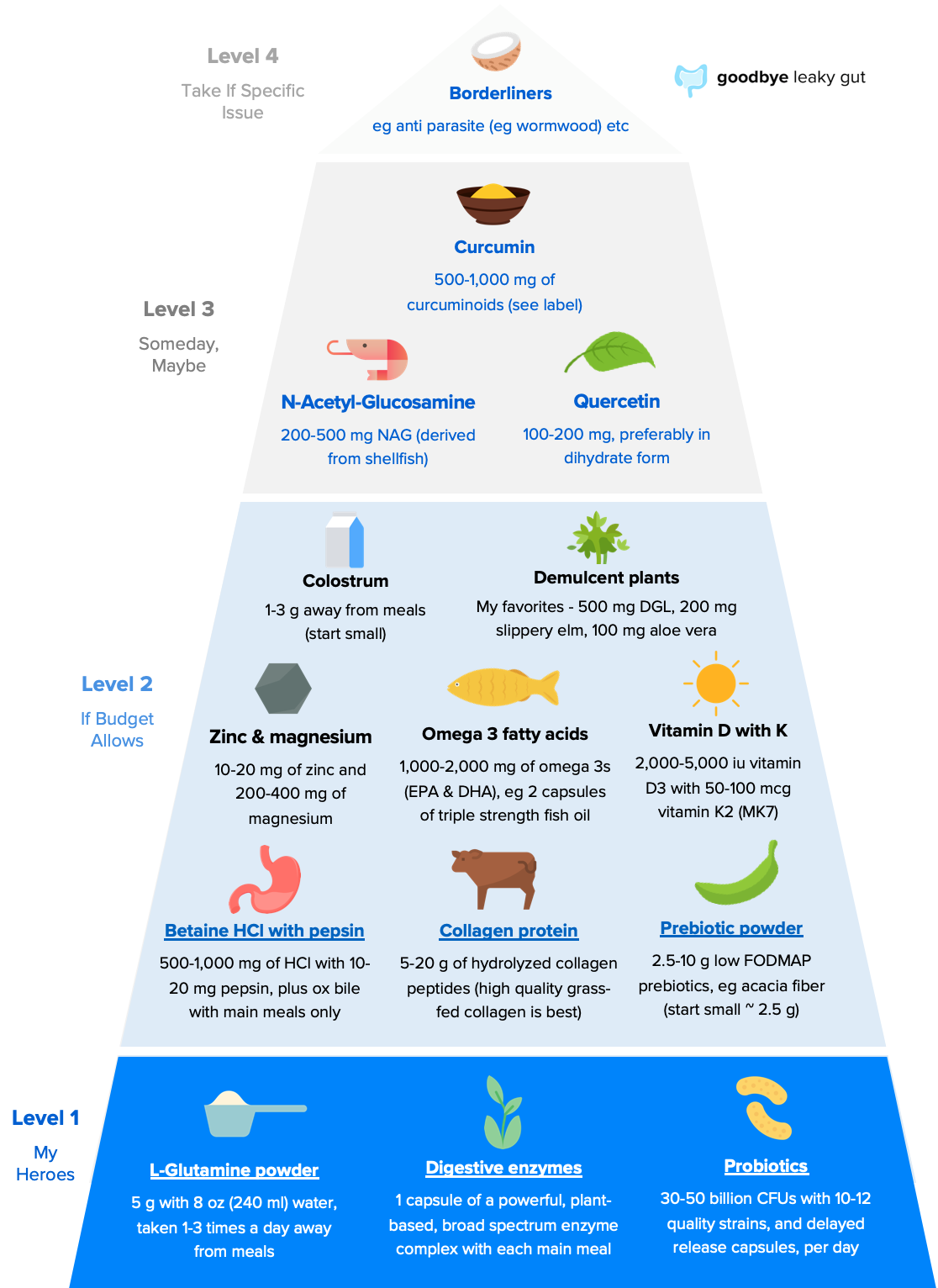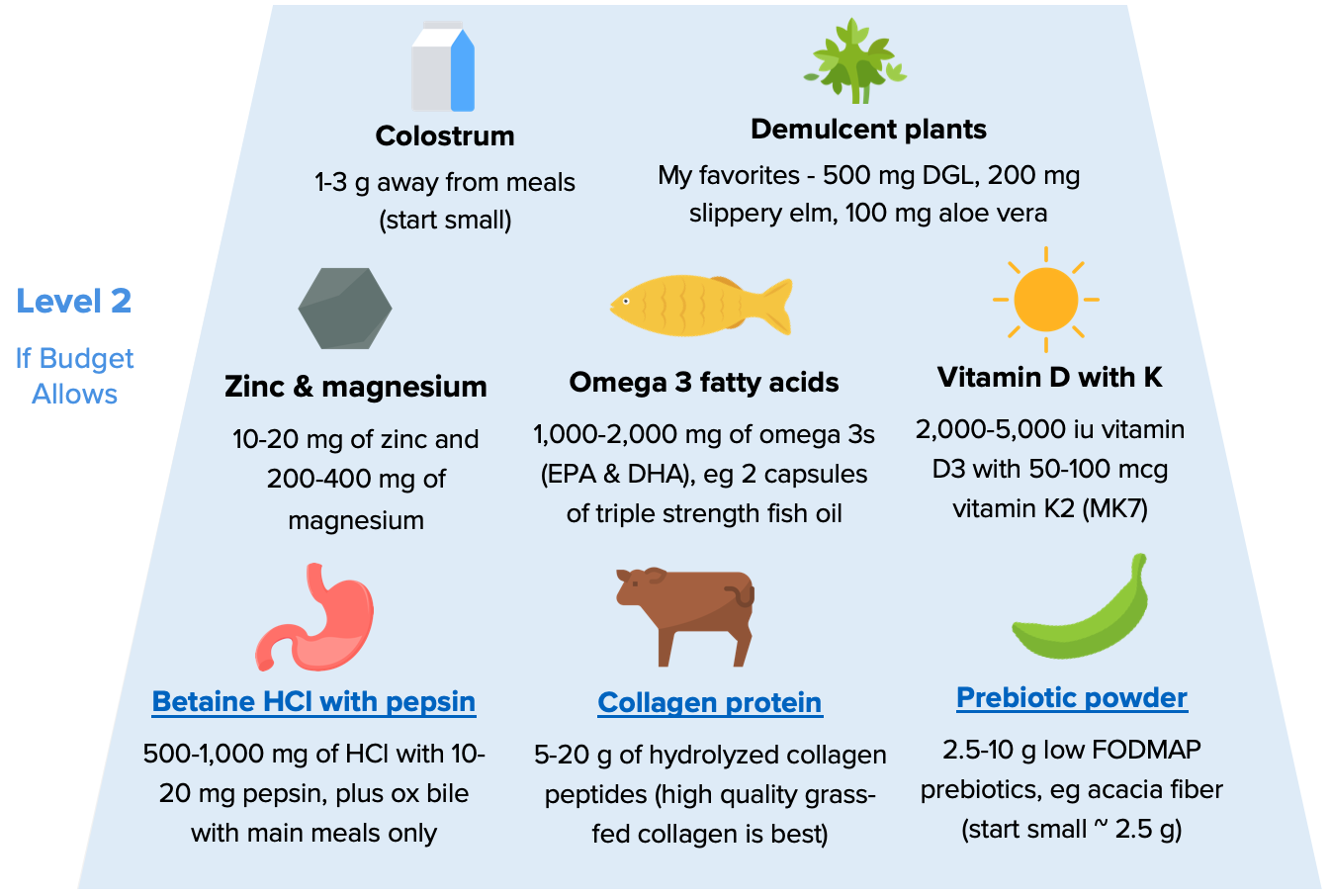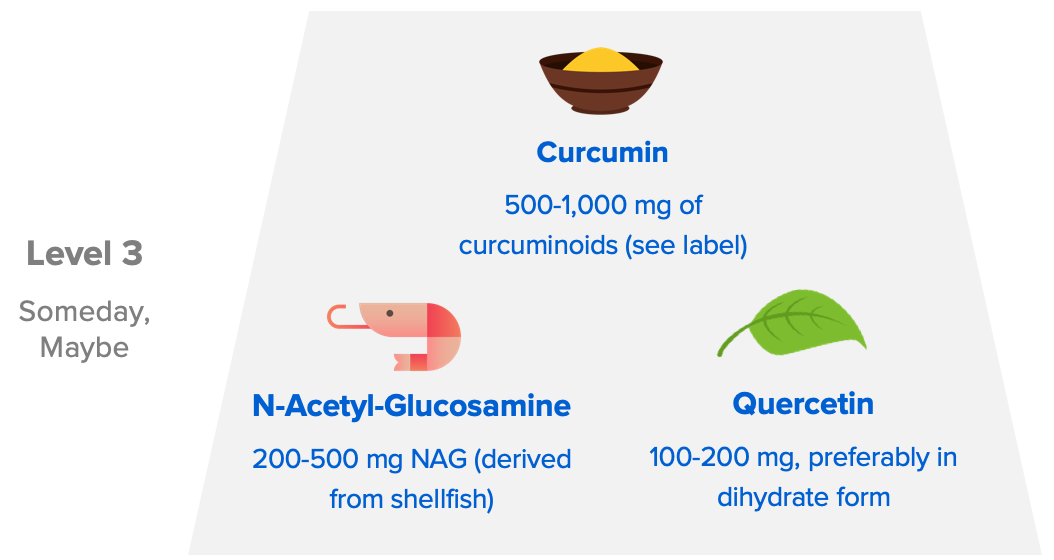In a world where most supplements do next to nothing to help gut health, the big question is which ones actually work? In this ultimate guide to leaky gut supplements we will pinpoint the top 15 (plus my favorite 3). Let’s go!
Last Updated: Nov 7, 2023

In this guide, you’ll discover…
The #1 question I get from you lovely readers is…
“Richard, I’ve read about dozens of different supplements that can help with leaky gut. And seen literally 100s of different brands to choose from.
I don’t have time to study them all and work out what’s best. So give it up you intestine-obsessed health nut…what are the ‘must have’ supplements?”
And it’s a great question!
After all, if you Google “leaky gut supplements” you’re going to be hit by 1000s of sites proclaiming they know what works.
From general health sites to low quality news sites, the Internet is awash in articles like “3 newly discovered Amazonian berries that can heal your gut”.
Give me a break! Not only do these sites NOT specialize in leaky gut, but they don’t even specialize in gut health in general.
The lack of expertise about supplements & leaky gut is a BIG problem
And that’s because leaky gut requires a very unique set of supplements, as well as specific rules for taking them, eg which form of that supplement to take, how much etc.
For example, prebiotics may help, but typically only specific types of prebiotics like these can be tolerated in the early stages of gut healing.
Even then, the dose protocol has to be smartly thought out so as not to create excess gas and bloating, or the proliferation of bad bacteria.
So when it comes to leaky gut and supplements, it is all about expertise!
And with over 150,000 words published on leaky gut, I feel best placed to deliver this to you.
Before we look at the best supplements (my free leaky gut guide here), it’s worth actually pausing to answer this question.
After all, in order to work out which supplements are best for us, we of course need to be clear on why we’re taking them in the first place.
So for those of us with leaky gut issues, I would say there are 3 main reasons why we are interested in supplements…
1) Help us digest our food better
You see, if we can properly break down the food we eat, we’ll be able to better absorb the nutrients in it (hello delicious amino acids, essential fatty acids, vitamins etc).
And since food is medicine, this improved absorption can in turn help our gut to heal.
Plus, better digestion can help reduce the number of large undigested food molecules from making their way down to our small intestine and bombarding our GI tract.
And with less irritation, we can hope to enjoy a stronger intestinal wall and thus less permeability issues (ie less leaky gut).
2) Support our intestinal wall
If we can nourish our wall/lining and keep it strong, we can directly reduce leaky gut, which means…
…we can help our body keep the bad guys out of our bloodstream (eg toxins, undigested food molecules etc), whilst simultaneously letting the good guys in (eg nutrients).
You see, in an ideal world your gut lining should be like the wall in Game of Thrones. (circa season 4 when it actually worked!)
i.e. it should be permeable (ie have some small openings/holes), so that the good guys can come and go as they please.
But not so many holes that it starts to let the big bad guys through as well – hello toxins and undigested food molecules (aka the White Walkers of digestive health!)
To help us achieve this, we want to make sure our intestinal lining is being supported with the nutrients/fuel it craves, as well as an army of their protective friends, like a strong mucus layer.
3) Help our gut bacteria, aka microbiome
Since our bacteria can influence our digestion, gut wall integrity, as well as a slew of other functions, such as yeast balance, this is the third big goal.
And the two major things we can do here is send down more of the good guys (good bacteria/probiotics), and send down more food for them (prebiotics).
If you’re starting to feel like your gut really is like a Game of Thrones war zone, and we need to send it all kinds of support, you’d be just about right.
Food and drinks are, and always will be, the #1 source of our support. From collagen-rich bone broth to probiotic-packed sauerkraut, they are the foundation of our gut health.
But supplements can be extremely handy as an additional source of support, since they’re often much easier to take.
For example, compare having to ferment sauerkraut for weeks and then needing to eat a small bowl of it each day, versus simply popping 1 capsule of a probiotic supplement daily. The latter requires no prep or cooking, takes 5 seconds and is tasteless. Easy as!
Also, supplements are really good at giving us some room for error. A type of insurance policy if you like.
For example, if we take digestive enzymes with lactase enzymes (for digesting lactose sugar in dairy) and peptidase enzymes in DPP-IV form (for digesting gluten and casein protein in say pasta and dairy respectively), then we can eat a little naughtier now and then, and not feel so bad. Pretty cool!
So although food & drinks are always #1, supplements are an extremely useful lil helper to have around.
Without further ado…
Finally, the top 15 supplements for leaky gut revealed AND ranked on one page!

Here’s how I’ve broken the pyramid up
1) Level 1 – Must haves
These are the supplements I take no matter what.
And that’s because they have the most direct impact on our gut health (especially intestinal lining), are hard to get from our food, give the best bang for buck, and of course, are backed by the most studies.
Only 3 fit the bill!

- L-Glutamine powder – 5 g with 8 oz (240 ml) water, taken 1-3 times a day away from meals
- Digestive enzymes – 1 capsule of a powerful, plant-based, broad spectrum enzyme complex with each main meal
- Probiotics – 30-50 billion CFUs with 10-12 quality strains, and delayed release capsule, per day
You’ve no doubt heard about all 3, and you probably already take some of them. They truly are the superheroes!
2) Level 2 – Good if budget allows
There are some fantastic supplements in this level of the pyramid. Roughly 8 in total.

- Betaine HCl with pepsin – 500-1,000 mg of HCl with 10-20 mg pepsin and ideally 25-50mg ox bile to support initial break down of both protein and fat
- Collagen protein – 5-20 g of hydrolyzed collagen peptides (most bioavailable version) – opt for high quality grass-fed collagen like this one
- Prebiotic powder – 2.5-10 g of low FODMAP prebiotics like Acacia Fiber (start small)
- Zinc & magnesium – 10-20 mg of zinc and 200-400 mg of magnesium
- Omega 3 fatty acids – 1,000-2,000 mg of omega 3s, eg 2 capsules of triple strength fish oil
- Vitamin D with K – 2,000-5,000 iu vitamin D3 with 50-100 mcg vitamin K2 (MK7)
- Colostrum – 1-3 g away from meals (start small)
- Demulcent plants – My favorites – 500 mg DGL licorice, 200 mg slippery elm, 100 mg marshmallow root, 100 mg aloe vera
But since no one has the time or money to take all of them, I’ve specified criteria and questions to ask yourself to determine what makes sense for you (which you can find further down this article).
This is super important for making your supplement protocol realistic (and something you’ll actually stick with).
3) Level 3 – Experiment someday/maybe
This is a collection of interesting supplements that could help, but whose efficacy data is nowhere near as solid as supplements in Levels 1 and 2.

- N-Acetyl-Glucosamine – 200-500 mg NAG (derived from shellfish)
- Quercetin – 100-200 mg, preferably in dihydrate form
- Curcumin – 500-1,000 mg of curcuminoids (see label)
In other words, they’re worth looking at ‘someday’ if you’ve tried all the others and are still not feeling great.
4) Level 4 – For specific issues only
Only worth considering if you are trying to tackle a very particular issue.

eg parasites or yeast overgrowth etc.
How we went from 73 potential supplements for leaky gut to a top 15
I know supplements can be expensive and time consuming to take. And I don’t want you to waste your money or time. So the team and I were extremely diligent in our research and in reaching consensus.
In the end, we actually managed to order every supplement in the pyramid from most important to least, so you know exactly what to pay most of your attention to.
And it took days and days of work with my team of digestive health experts to build this pyramid for you.
You see, although there are a lot of terrible supplements out there, that do next to nothing for gut health (hello Amazonian berries!), there are quite a few that offer great support.
From mucus secretion promoters to intestinal lining feeders, it is a wild and wondrous world. In fact, we started with a list of 73 worthwhile contenders!
Not only did I want to whittle the 73 down into just 15, but I then wanted to narrow it down even further to a simple top 3.
I don’t expect anyone to take all 15 after all! Heck, even 3-4 supplements can feel like a lot. So further below, I will also run through my very practical tips on “What to buy?”.
I’ve based these recommendations on efficacy data from 100s of studies, as well as my personal experience and the reports of 1000s of readers.
For example, you’ll see L-Glutamine powder – a simple 1-ingredient supplement – absolutely dominating the rankings. It has many studies focused on intestinal permeability support, plus it is the #1 supplement readers have told me helped them the most – and the fastest.
With 15 supplements making the pyramid, it can be hard to know which to buy. Here are my 3 favorites.
Unlike most of the other supplements, these three can help from day one and really support our intestinal tract from all angles. They are my superheroes.
1) L-Glutamine
Just like protein powder feeds your muscles so they can repair and grow stronger, L-Glutamine fuels your gut lining so it too can repair damaged cells and come back healthier.
In fact, the cells lining your gut love L-Glutamine so much that they’re able to absorb it directly, making supplementation very effective.
I’m proud to recommend this L-Glutamine powder, because it has 5 g of free form L-Glutamine per serve, plus no fillers, no sugar & no nasty stuff. I love it!
And so must you lovely readers, as it is now our #1 most popular supplement. Thank you for showing the love!
2) Digestive Enzymes
These hard working little guys take the food we eat and break it down into individual nutrients so our body can actually absorb the amino acids, vitamins, minerals etc from our food.
This is super important for those of us with leaky gut, because our damaged gut lining is likely to not be absorbing nutrients properly, and yet needs the nutrients to repair itself.
So enzymes can help get us out of the vicious cycle.
Plus, by digesting food better, enzymes also reduce the number of large undigested food molecules from making their way down to our small intestine and bombarding our GI tract. Making them a fantastic double win!
Check out these enzymes – it is a broad spectrum blend of 18 different digestive enzymes, making it great for all types of meals. This can be a true game changer.
3) Probiotics
One of the most interesting roles probiotics can play is their ability to fight leaky gut by enhancing the production of tight junction proteins, i.e. helping to strengthen our intestinal barrier.
In addition, they can help to fight off two of the main culprits of leaky gut, being bad bacteria and yeast overgrowth.
Love them!
If you’re looking for a professional-grade probiotic, try this probiotic. It is made with 11 of the best strains on the market and packs a whopping 50 billion CFUs of good bacteria per capsule.
These are the next best supplements in the pyramid. Very helpful, but only if you have the time & money.
With several options here, please talk to your doctor to determine what makes the most sense for you personally. Here are some quick thoughts.
1) Betaine HCl
Still experiencing the occasional food baby, aka bloating? Consider my latest and most requested formulation, Betaine HCl with Pepsin & Ox Bile.
These 3 ingredients help to support digestion where it starts – in the stomach. And that can make all the difference, especially when eating proteins and fats.
I absolutely love how this complements our digestive enzymes – i.e. HCL with pepsin & bile does the initial heavy digesting, and then the digestive enzymes come in to finish the job. What a team!
2) Collagen Peptides
Sick of drinking bone broth? Try this Collagen.
It contains the secret ingredient in bone broth (which is collagen) and in a concentrated, pure & unflavored form.
Best of all, this Collagen is made from grass-fed, pasture-raised cows and is very easy to mix in water & drink any time. Making it a great way to further feed and repair our GI tract.
3) Prebiotics
Struggling to eat enough prebiotic foods, eg green bananas? Try these prebiotics.
Prebiotics are like fertilizer for the the good bacteria (probiotics) in our gut. So by taking them we maximize all the amazing benefits of the probiotics. The problem is most prebiotic supplements contain fibers that can cause bloating and ‘bathroom issues’, eg high FODMAP fibers like chicory.
That’s why we created Friendly Prebiotics, which exclusively uses organic, plant-based and low FODMAP prebiotic fibers. That means we can feed our good bacteria and get things ‘moving’, but without the bloating often associated with normal prebiotics.
1) Print off the pyramid poster above
This is the 3rd pyramid! And just like with the food pyramid and drinks pyramid, it is worth printing out and sticking up somewhere visible. It’ll serve as the perfect reminder and clarifier.
2) Shop your ‘favorites’ from Levels 1 & 2
Unlike food and drinks, it can be a bit hard to say which are your ‘favorites’.
For example, no one is running around like a collagen-crazed cookie monster screaming “Ooooh, I love the taste of hydrolyzed collagen, me want peptides!”.
So to help you narrow in on the best supplements to shop for, I’ve made a quick guide below. Some notes about the guide:
- ‘Must Haves’ – I’ve focused on the supplements from the pyramid that have the most direct impact on our gut health (especially intestinal lining), are hard to get from our food, give the best bang for buck, and of course, are backed by the most studies. These are my personal must haves.
- ‘If Budget Allows’ – There are some fantastic supplements here. But since no one has the time or money to take all of them, I’ve specified criteria and questions to ask yourself to determine what makes sense for you. This is super important for making your supplement protocol realistic.
- Where to buy – I’ve included Amazon links for all products, because there is no easier way to buy and all Prime members get free 1-2 day shipping.
- ZERO affiliate links – every product I link to is simply the one I use each day, and was also a part of the formulation team for. So not only do I love these supplements, but they are even my babies.
3) If desired, experiment with Levels 3 & 4
There are some interesting supplements at the top of the pyramid. And they can be worth experimenting with if your doctor or healthcare professional thinks they could help with a specific issue.
But I personally would focus on Levels 1 and 2 before devoting money and effort to trying Levels 3 and 4.
I know supplements can be expensive and time consuming to take. And I don’t want you to waste either your money or your time.
So the team and I were extremely diligent in our research and in reaching consensus.
We based our recommendations on efficacy data from 100s of studies, as well as my personal experience and the reports of 1000s of readers.
And as you saw, we whittled a list of 73 contenders down to just 15 and then whittled it even further to a top 3 – the must haves, which you can checkout here, here and here.
That means you can now see what to prioritize and what you can simply put on your ‘someday, maybe’ list.
So pick the best and forget the rest!
And most of all, speak to your doctor or healthcare professional to ensure each supplement makes sense for you personally.
